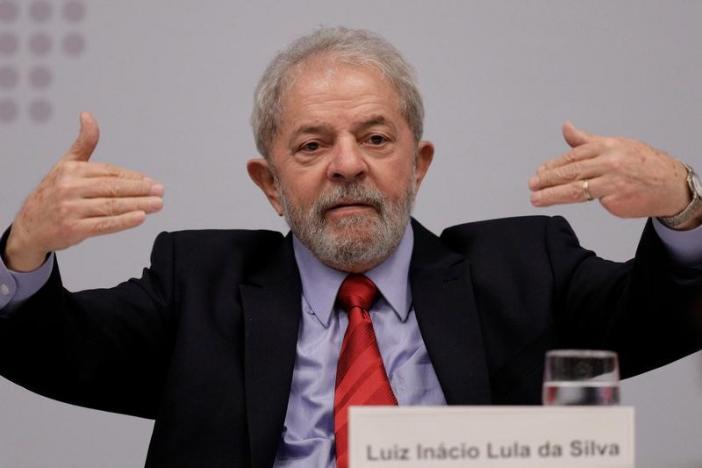
"He is calm, relaxed, with the clear conscience of an innocent person," said Gleisi Hoffmann, leader of the leftist Workers' Party founded by Lula after he rose from poverty as a trade union organizer during Brazil's 1964-85 dictatorship.
Lula, a two-term former president who leads in polls ahead of the October 7 presidential election, has not spoken publicly since the court denied a request late Wednesday to delay his prison sentence.
He had petitioned to be allowed to remain free while pursuing appeals in higher courts against his conviction for receiving a seaside apartment as a bribe from a construction company. A lower court appeal failed this January.
Brazil's Lula faces imminent prison after Supreme Court ruling
However, the Supreme Court judges ruled 6-5 that under the law, Lula must begin his sentence after having lost the first appeal.
The Workers Party announced that Lula would address a rally in his hometown of Sao Bernardo do Campo, a suburb of Sao Paulo, late on Friday.
Brazil's left is furious, seeing Lula's imminent imprisonment as a plot to prevent the Workers' Party from returning to power. Hoffmann said the court ruling violated "constitutional law and the presumption of innocence" and made Brazil "look like a little banana republic."
However, there were celebrations on the right and among prosecutors supporting the epic "Car Wash" anti-graft probe, which has revealed high-level corruption throughout Brazilian business and politics over the last four years.
To them, Lula epitomizes Brazil's corruption-riddled elite. His conviction on charges of accepting a seaside apartment as a bribe is "Car Wash's" biggest scalp by far.
Lawyers for the former president, who ruled from 2003 to 2011, have few remaining cards.
They have until Monday to file a final, purely technical appeal with the lower court that turned down Lula's first appeal in January.
But this latest appeal would almost certainly be quickly rejected and Lula, once one of the world's most popular politicians, would be ordered to start his sentence immediately.
Lula, who grew up poor and with little formal education before becoming a trade union leader and politician, says he will go down fighting.
Analysts say that his election hopes, which were already slim, have now been dealt a body blow. But he is not necessarily knocked out.
In theory, once someone has been convicted and lost their lower court appeal, they are barred from running for office under Brazil's clean slate law. But the issue will not be decided for months.
Lula has until mid-August to register his candidacy and only after that will the Superior Electoral Tribunal rule on whether his candidacy is valid.
Brazil's divided Supreme Court debates prison for Lula
Even if he were barred, as seems likely, he would have an opportunity during that period to exercise influence on his followers, possibly preparing the way for a replacement candidate.
"The party's idea is to maintain his candidacy whatever the circumstances until the (election court) turns him down, and to start working on a name as plan B," Globo political columnist Gerson Camarotti wrote Thursday.
Michael Mohallem, a politics professor with the Getulio Vargas Foundation, said "he probably won't have the conditions to be a candidate."
"Brazilians would surely have trouble with this, rejecting a candidate who was in prison," he said.
In the latest election polling, Lula scores more than 30 percent, with his nearest rivals in a crowded field getting only around half that.
Reflecting profound polarization in Brazil, the runner-up would be hard-line former army officer Jair Bolsonaro, an open fan of Brazil's 1964-1985 military dictatorship.
Current centre-right President Michel Temer —who took over in 2016 after the hugely controversial impeachment of President Dilma Rousseff from Lula's Workers' Party —is himself accused of serious corruption.
Temer however has been shielded by Congress, which is dominated by his allies, and has not had to face trial.
A new poll from Ibope that was published Thursday showed only five percent of Brazilians think Temer's government is doing a good or very good job.






1732445375-0/Untitled-design-(9)1732445375-0-270x192.webp)


1732428810-0/Copy-of-Untitled-(3)1732428810-0-270x192.webp)
1732425487-0/BeFunk_§_]__-(42)1732425487-0.jpg)






COMMENTS
Comments are moderated and generally will be posted if they are on-topic and not abusive.
For more information, please see our Comments FAQ